June 20, 2025 | 00:21 GMT +7
June 20, 2025 | 00:21 GMT +7
Hotline: 0913.378.918
June 20, 2025 | 00:21 GMT +7
Hotline: 0913.378.918
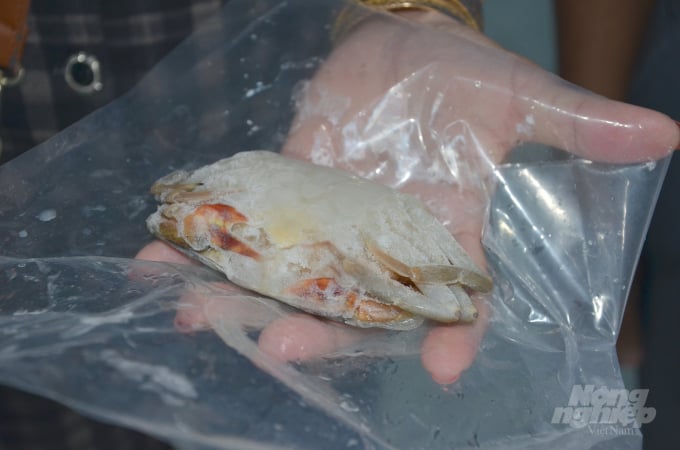
Soft-shelled crab produced by Vinacrab Joint Stock Company. Photo: Minh Dam.
Many people like sea crab - a product that has high nutritional value and delicious taste. In particular, soft-shelled crab is a very rare on the market because it is difficult to harvest a large amount of soft shell crabs in nature.
However, Vinacrab Joint Stock Company, a science and technology enterprise of Phu Yen province has researched and applied a technological process to get soft shell crabs in mass, producing products with uniform quality and look.
Currently, the processed shell crab products of this enterprise are considered as high-class products, which consumers welcome a lot. The selling price usually ranges from VND500,000 per kg.
The company has brought technology to Tra Vinh province to build a factory and connect with farmers to raise raw crab materials for the production and processing of shelled crabs, bringing high efficiency.
Nguyen Xuan Thuy, Sales Director of Vinacrab Joint Stock Company, said that in the world, Indonesia and Thailand produced excellent shellfish products and exported the products to many markets.
In Southeast Asia, there are three popular types - black crab, blue crab and red crab. However, their soft-shelled balck crab and the red ones did not look as nice as Vietnam's blue crabs. This is the particularity and advantage of Vietnamese crabs, Thuy said.
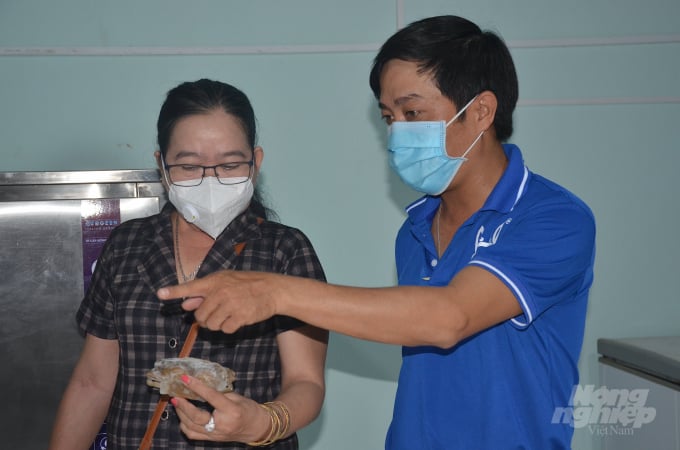
Farmers visit the factory and learn about the linkage model of raw shell crab farming. Photo: Minh Dam.
According to Thuy, in the past, Vietnam only had wild soft shell crabs, so it did not have enough for export. However, with scientific technology, VinaCrab has owned a process to help crabs shed in mass naturally.
“That is an antibiotic-free technology. Therefore, Vinacrab is honored to be classified in the group of science and technology enterprises,” he said.
In addition to owning a unique process of producing soft-shelled crabs, VinaCrab also owns a high-density raw crab farming process to serve the production of soft-shelled crabs. This process has now been certified for intellectual property. Currently, Vinacrab is transferring to Tra Vinh farmers, typically the first five farmers in Duyen Hai Town.
The model Vinacrab transferred to farmers is to raise 30,000 breeding crab on a small area of 1,500 sq.m in two stages lasting 45 - 60 days. The rate of rearing in the nursery stage is 20 fish/m2 and the foster rearing rate is 7 fish/m2.
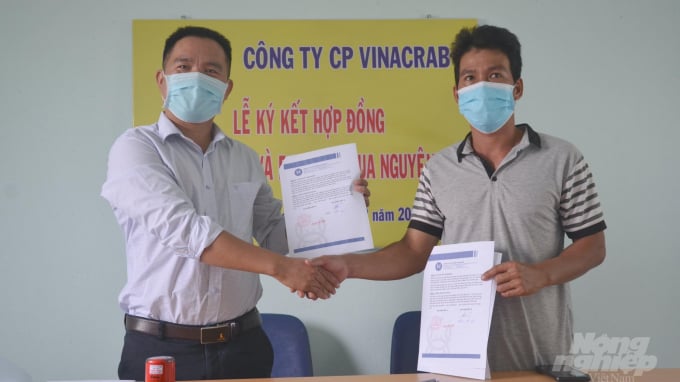
Nguyen Van Nghia (left), General Director of VinaCrab Joint Stock Company signed a contract to associate crab production with farmers in Duyen Hai Town. Photo: Minh Dam.
Specifically, the process consists of five stages including pond preparation, rearing, foster rearing, harvesting and transportation. Each stage has its own technological know-how to create qualified raw crabs before they are put into the factory for molting. Raw crabs have a weight of about 70 - 80 g/head, which is about 13 - 14 fish/kg.
Notably, through the implementation of the model, the survival rate of crabs reached over 46 per cent. The profit is nearly VND90 million per cultivation cycle, while the investment cost is only nearly VND50 million.
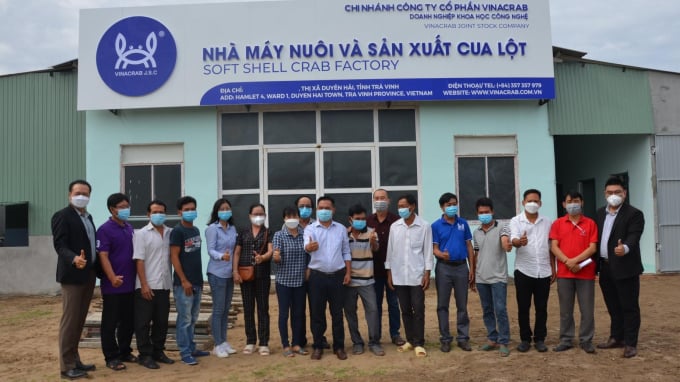
Soft-shelled carb factory VinaCrab Joint Stock Company. Photo: Minh Dam.
Duyen Hai town has various types of aquaculture farming like as white-leg shrimp farming, black tiger shrimp farming, sea crab farming and bivalve molluscs (clams and blood cockles) farming.
The town over 4,100 ha of sea crab farming, with an output of 1,600 - 2,300 tonnes per year. The town has favorable conditions to develop sea crab farming. Local sea crab farming has a long tradition. In the past, farmers used to intercrop in the fields and improve extensive shrimp farming.
Given that this is a great potential for the company to invest in, Vinacra Joint Stock Company selected Duyen Hai Town to develop a raw crab raising area in Vietnam.
Vinacrab will co-produce with farmers with an estimated output of 120 tonnes per year. With this chain of links, the company aims to conquer the domestic market for the first time this year. After that, it will export within the next five years with a scale of 1,000-1,500 tonnes per year.
Evaluating the linkage model of raw shell crab farming between Vinacrab and local farmers, Huynh Van Mau, Head of Duyen Hai Town’s Economic Department said that it was a great potential to develop more sea crab farming. It would help increase the output and value of sea crabs through the supply of raw materials for the production of shell crabs to Vinacrab's factory located in Duyen Hai Town.
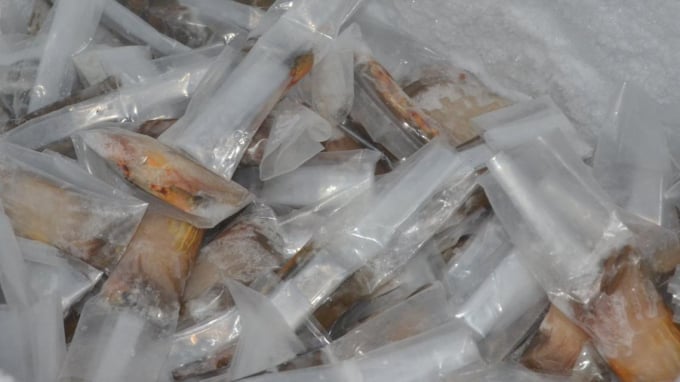
VinaCrab Joint Stock Company expects to export 1,000 to 1,500 tonnes of soft-shelled crabs yearly. Photo: MD.
In the past time, crab farmers were much worried about the output of their products as they had to depend a lot on traders. Signing co-operation contracts with farmers, Vinacrab Company has created the trust and stable prices for crab products. At the same time, as the farming time is very short, from 45 to 60 days, with high-density farming and small area, crab farming is suitable for households who do not have much farming land. The farming is a suitable model that helps farmers get out of poverty. Besides crab farming, farmers can do other jobs in parallel as crab farming does not require much time.
Translated by Hien Anh
/2025/06/17/3942-2-143243_548.jpg)
(VAN) Recently, in Sweden, the Secretary of the Binh Dinh Provincial Party Committee presented the Investment Registration Certificate for the 'Polyester Fabric Recycling Complex' project to SYRE Impact-AB Company.
/2025/06/12/3721-2-202745_83.jpg)
(VAN) TH made an impression at Seoul Food 2025 with its line of natural beverages, paving the way for Vietnamese food products to enter the South Korean market.

(VAN) Soc Trang's success in rice exports stems from a strategy of developing fragrant and specialty rice cultivation areas and standardizing production toward low-emission practices.
/2025/06/11/1311-5-120811_839.jpg)
(VAN) The pig farming industry is facing the challenge of comprehensive restructuring to meet requirements for quality, safety, traceability, and market expansion both domestically and for export.

(VAN) Vietnam considers participating in ALGROALBA in order to expand agricultural production, coordinate the assessment and effective exploitation potential land.
/2025/06/05/5314-1-184727_407.jpg)
(VAN) From seemingly worthless fish scales and skin, enzymes and lactic ferments can transform by-products into peptides, opening a sustainable, effective business direction and elevating Vietnamese seafood.

(VAN) TTC AgriS and IFC signed a strategic partnership to develop a sustainable agricultural value chain, aiming to achieve the Net Zero target by 2035.